
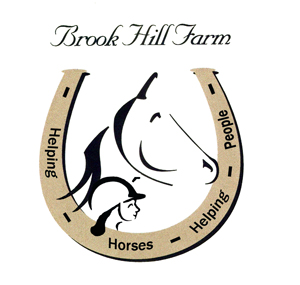
Brook Hill Farm
7289 Bellevue Road
FOREST, VA 24551
Mailing Address:
7291 Bellevue Road
FOREST, VA 24551
Phone: 540-586-0207
MAKE AN INQUIRY
View our WEBSITE
EIN: 54-2058686Founded: 2001
View our PHOTO GALLERY
Profile Last Updated November 14, 2025Public Charity
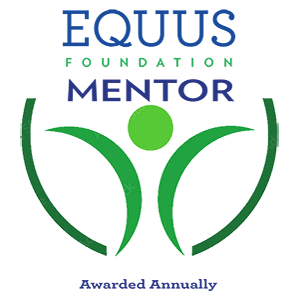
The Mentor Accreditation is awarded annually to an organization that operates at the highest standards for business and equine welfare practices in accordance with EQUUS Foundation guidelines for business and equine welfare practices outlined here.
Last Updated: November 14, 2025

MISSION & PROGRAMS
Mission:Brook Hill Farm, a non-profit horse rescue and therapeutic riding organization, exists to provide rehabilitation focused services and safe haven for unwanted horses, as well as offers a therapeutic riding program for personal growth and equine education for the community.
Our organization provides programs involved with equine rescue, adoption & retirement
Our organization conducts Equine Assisted Services in accordance with the EQUUS Foundation Guidelines on Qualifications of Organizations Conducting Equine Assisted Services (EAS).
Our organization provides outreach and/or public education programs involving horses.
100% of our total programs and services are equine-related.
Our organization is directly responsible for the care and shelter of equines involved in our programs.
Our organization does not CURRENTLY use satellite, overflow, foster, and/or outreach facilities.
Please describe what steps your organization takes to ensure that:
1) all interactions between your equines and people are mutually beneficial and conducted in accordance with the Guidelines for Human-Equine Interactions stated below;
2) all equines in the care of our organization and/or equines that participate in the organization's program have access to clean drinking water at all times; nutritious food in sufficient quantity, including natural forage such as pasture grass and/or hay; appropriate veterinary, farrier, and dental care; shelter and protection from the weather; sufficient safe space to move around comfortably on a daily basis; and daily opportunity to freely interact and have contact with other equines:
Brook Hill believes in the 5 Domain model by David Mellor to ensure that horses have the best lives possible. This includes access to forage 24/7, excellent nutrition, physical health as suggested by a veterinarian, and an environment that allows freedom of movement, resting areas, and socialization with friends. Brook Hill horses live out 24/7 on 60 acres with a mixed herd of 40 horses with access to food and water at all times. This helps with their behavioral health and their mental state, allowing them to have the best life possible, living as nature intended. The Executive Director and staff stay up to date on the current research about the best and most natural way to care for horses.
When a horse is allowed to be a horse, the one hour a day they participate in our programs in the arenas minimizes the impact of stress upon our herd. Brook Hill follows the Human-Equine Interactions set forth by the EQUUS Foundation.
Equine Transition Services:
Overview of our programs involved with rescue, rehabilitation, retraining, re-homing and/or retirement:
Brook Hill Farm is committed to providing a safe harbor and rehabilitative focused services for abused, neglected, and injured horses. Most of the horses come from seizures and owner surrenders. Brook Hill Farm is proud to serve as the local animal shelter for horses for Bedford County.
Many of the horses that come to the farm are high level performance horses that have suffered potentially career-ending injuries. The majority of these injuries heal with time, and the horses are able to resume their discipline at some level. Brook Hill Farm has a dedicated group of professionals including veterinarians, a chiropractor, an acupuncturist, a massage therapist, a farrier, and a dentist, who all work together with the staff and volunteers to create a rehabilitation plan uniquely tailored for each horse based on their individual needs.
Brook Hill Farm is a fully accredited through the Global Federation of Animal Sanctuaries, and the Thoroughbred Aftercare Alliance. The farm guarantees all of the horses a lifetime of care. Many neglected and injured horses never fully recover. Brook Hill Farm is a place for horses to enjoy their retirement. Horses are domesticated creatures that thrive when given a purpose. Here at Brook Hill Farm the horses are tended to on a daily basis, being fed, groomed, and loved. These horses remain on the property in sanctuary and are cared for by the staff and volunteers for the remainder of their life.
Brook Hill Farm has developed an innovative companion program that allows local horse owners to borrow retirees for a limited time span. These horses act as a friend for a horse that lives alone or stays with a foal as it is weaned. Brook Hill is proud to report that many of these temporary placements have led to permanent homes. Many other retired horses become part of the Equine Assisted Service Programs, helping youth and adults find healing through the bond of horses.
Equine Assisted Services (EAS) Overview:
Overview of our programs involved with providing EAS to individuals with special needs:
Brook Hill Farm, a Path Premier Riding Center, provides the following programs:
1) Rockin’ Riders - A Traditional Therapeutic Riding Experience
Brook Hill Farm’s Rockin’ Riders Program was designed to serve people with special needs in an inclusive community-based setting. The participants are taught riding and horsemanship skills in a social environment. The Rockin Rider experience aids in promoting physical, mental, and emotional well-being. The program pairs participants with rescue horses to work on developing riding skills and independence. A new rider is generality assisted by two side-walkers and a horse leader and are taught by a certified therapeutic riding instructor (CTRI). Unlike most programs, with the help of licensed educators and our licensed counselor, our program includes teaching horsemanship, horse knowledge, and helps to allow this population to participate in recreational horse activities. This program is also open to Veterans.
2) Schooling with Horses Pod School
Brook Hill Farm offers professional Equine Assisted Learning (EAL) in a small pod school environment for local at-risk youth, and for youth that have been truant. This program offers many different activities involving the rescue horse as a partner, both under saddle and on the ground. Educators, a counselor, and a riding instructor develop an Individual Horse Program for each student, based on their individual needs. Skills taught in the riding arena are riding skills, academics, self-mastery, empathy, and resilience, with special emphasis placed on teaching life skills that improve socialization, relationship building and behavior. The sessions are led by an educator, with the help of a counselor, both trained in equine assisted learning in education. The participants work on their academics each morning and participate in horse activities in the afternoon.
3) United Neigh: “An At-risk youth development program with the goal of High School graduation”
Brook Hill Farm’s unique program, United Neigh, utilizes Equine Assisted Learning in Education combined with traditional tutoring to provide at-risk ages 12-18, who have a learning disability, or are socially disadvantaged. Participants follow a program that instills self-confidence, a strong sense of personal responsibility, recognition of the value of teamwork, and real-life workplace skills. The youth come to the farm two days a week and get to call a rescue horse their own as they aid the farm with its mission of rehabilitation. College interns serve as mentors. These role models promote the value of education, healthy lifestyle choices, and hard work in a safe, supportive family setting. Academic performance is a high priority; the youth struggling with schoolwork are taught skills in the arena to aid in success at school.
The Equine Assisted Learning in Education model provides a program that teaches young people a strong sense of personal responsibility, work ethic, and accountability. Everyone works together towards the mission of helping the rescue horses. Through hard work and love, the youth care for and heal their rescue horses, and, very often, find healing themselves. Since the program’s inception in 2002, the at-risk youth who have completed the program have all graduated from high school and have pursued some type of secondary education.
4) Seniors Helping Seniors
The program was created in order to support, socialize, and enhance the life of the sanctuary horses. In return, the horses allow the seniors to socialize and meet the physical tests of growing older as well as share their horse experiences with the rest of us! They participate in learning sessions, grooming, and riding when appropriate.
5) Gaits 4 Change
Gaits 4 Change was developed to serve youth in transition, those in social service programs, or those who are not eligible for the Rockin’ Riders program but are not yet ready for the United Neigh program. This small group has up to six participants and meets once a week to take part in Equine-Assisted Learning in Personal Development, horsemanship, and riding skills. A licensed counselor also participates in these sessions to aid those with mental health issues function in a group setting.
6) Saddle Club
This program was developed for young horse enthusiasts with learning disabilities, ages 6 - 12 who are interested in learning how to ride, with the emphasis on horse care and management. This gives young riders a strong foundation both in riding and in horsemanship
7) Hero’s Helping Hero’s
Horses are noble, helpful, and good for the spirit. Equine interactions are an increasingly popular activity for veterans recovering from injuries, both physical and mental. A licensed counselor participates in these sessions to aid those with mental health issues function in a group setting. This program is sponsored by the Wounded Warriors Project, so it is free for our Veterans!
Equine Assisted Services (EAS) and Providers:
Our organization provides the following Equine Assisted Services (EAS):
Adaptive/Therapeutic Riding
Adaptive/Therapeutic Unmounted Horsemanship
Psychotherapy/Counseling
Equine-assisted Learning in Education
Equine-assisted Learning in Personal Development
6: Total number of Equine Assisted Service Providers at Brook Hill Retirement Center for Horses, Inc.
1 Brandi Moore
FACILITY PARTICIPATION:
Brook Hill Retirement Center for Horses, Inc.
RELATIONSHIP: Volunteer
SERVICES PROVIDED:
Equine-assisted Learning in Education
DEGREES, LICENSES AND/OR CERTIFICATIONS
Brandi Moore is a licensed teacher.
2 Brandon Harrison
FACILITY PARTICIPATION:
Brook Hill Retirement Center for Horses, Inc.
RELATIONSHIP: Employee
SERVICES PROVIDED:
Adaptive/Therapeutic Riding
Adaptive/Therapeutic Unmounted Horsemanship
DEGREES, LICENSES AND/OR CERTIFICATIONS
Brandon is an instructor in training for his CTRI
3 Gayanne Sparrazza
FACILITY PARTICIPATION:
Brook Hill Retirement Center for Horses, Inc.
RELATIONSHIP: Employee
SERVICES PROVIDED:
Equine-assisted Learning in Education
DEGREES, LICENSES AND/OR CERTIFICATIONS
Gayanne is a licensed Educator
4 Jane Burks
FACILITY PARTICIPATION:
Brook Hill Retirement Center for Horses, Inc.
RELATIONSHIP: Employee
SERVICES PROVIDED:
Psychotherapy/Counseling
Equine-assisted Learning in Personal Development
DEGREES, LICENSES AND/OR CERTIFICATIONS
Jane holds a certification as a qualified mental health professional, holding a master's degree in counseling with over 30 years 'experience as a licensed school counselor and 5 years as a college professor at the master's level teaching counseling. She works in our Gaits for Change program and our program called Hero's Helping Hero's, working with veterans. She works alongside certified CTRIs or an ESMHL when working with clients.
5 Jo Anne Miller
FACILITY PARTICIPATION:
Brook Hill Retirement Center for Horses, Inc.
RELATIONSHIP: Employee
SERVICES PROVIDED:
Adaptive/Therapeutic Riding
Adaptive/Therapeutic Unmounted Horsemanship
Equine-assisted Learning in Education
DEGREES, LICENSES AND/OR CERTIFICATIONS
Jo Anne Miller is a CTRI and ESMHL certified through PATH International. She is the Executive Director of the organization, holds a degree in education, and is a retired Professor of Equine Science at Randolph College, having taught courses in equine behavior, introduction to equine science, and equine assisted services.
6 Tracy Russler
FACILITY PARTICIPATION:
Brook Hill Retirement Center for Horses, Inc.
RELATIONSHIP: Employee
SERVICES PROVIDED:
Adaptive/Therapeutic Riding
Adaptive/Therapeutic Unmounted Horsemanship
DEGREES, LICENSES AND/OR CERTIFICATIONS
Tracy is an Instructor in Training for her CTRI Certification for PATH International
Outreach and/or Public Education:
The mission of Brook Hill Farm is to offer equine education to the community. Brook Hill takes this very seriously, as there are so many horses needing homes. Educating the public about the horses is a way to help more horses in need!
• Learning Station Program: Brook Hill Farm offers a hands-on 2-hour educational program in basic horse care and knowledge to groups and organizations in our local community, including the Salvation Army, Horizon Behavioral Health, and School Groups.
• Brook Hill Farm partners with existing programs such as the Salvation Army, Alliance for Children, Church groups, School Groups and others to provide a hands-on one-day educational program in basic horse care and knowledge, that creates community awareness of the plight of the unwanted horse.
• Brook Hill offers exciting opportunities to Boy Scouts and Girl Scouts. The Boy Scouts have completed Eagle Scout projects including building new fence and building a deck. Girl Scouts have completed their Gold Key Award, such as helping to build the Rockin’ Riders arena. They also come to the farm to do one day service projects. Brook Hill Farm welcomes troops to come and see what Brook Hill Farm is about, and to meet and plan a troop or individual project! Please contact secretary@brookhillfarm.org to arrange a visit.
• Brook Hill Farm offers summer opportunities for local children teaching children all about horses in a small group setting, including horse biology and the proper care of horses. Each session runs for one week during the morning hours, and the session topics include horse care and safety, crafts, and mounted games. Many groups come to Brook Hill Farm to hold a club meeting – the farm loves to provide live demonstrations of the work that is done with people and horses.
• 4-H: In 2008, Brook Hill Farm established a 4-H Horse and Pony Club for all of the United Neigh members. With the four “H’s” standing for Head, Heart, Hands, and Health, 4-H possesses more than a century of experience in youth development programming. The emphasis of the horse and pony program is equine selection, nutrition, management, riding, recreation, fun and horsemanship. It has been proven that participating in 4-H horseback riding provides an outdoor sports fitness program for physical, personal, and emotional development, including confidence building. Most importantly, 4-H members pledge to build a better community, country and world for themselves and others. The 4-H program’s positive effect on youth aligns directly with the goals of the United Neigh At-Risk Youth Program.
• United States Pony Club: In 2011 Brook Hill Farm became an official United States Pony Club Riding Center in the Old Dominion Region, offering membership to United Neigh participants who have more advanced skills, and the capability to mainstream in equine activities. Brook Hill Farm’s mission encompasses the same core values as Pony Club; those of horsemanship, teamwork, respect, service and education. The curriculum of Pony Club includes riding on the flat, over fences, and in the open, providing an instructional program both mounted and unmounted, at all levels. The at-risk youth are able to attain certifications that are internationally recognized. Youth involved in our Adaptive Equestrian Sport programs can earn the right to become a member of the USPC, as they strive to maintain the core values of Pony Club.
• College Interns: In collaboration with regional schools including Virginia Tech, Randolph College, University of Lynchburg, Sweet Briar, and Liberty University, the farm provides many opportunities for college students to participate in a variety of internships earning them credit in the following fields: Animal Sciences, Animal Psychology, Biology, Business, Communications, and Pre-Veterinary Studies. The farm offers internships for Pre-Vet and Vet tech students, Pre-Med and Biology students, Psychology, Social Work and Counseling, Education, Horse Training, and Riding instruction.
• Brook Hill Farm partners with Randolph College teaching college courses in Equine Science including a course entitled, Introduction to Equine Science and Equine Assisted Services.
• Research: In keeping with its mission of education, Brook Hill Farm is involved in a number of research projects, from laboratory-based biological studies such as studies on better ways to cure rain rot or developing better methods doing parasite counts, to the relationship between Equine Assisted Learning in Education and high school graduation rates of at-risk youth. These projects are done in collaboration with colleges and universities, such as Virginia Tech and Randolph College.
• As our mission is education, the Brook Hill staff speak at regional and national conferences speaking on how to be a horse advocate. Topics revolve around equine welfare and include things like soundness of body and mind, horse management, how to develop a business plan, weight-carrying and workload, caring and compassionate planning for the older horse, etc.
Research/Medical Use of Equines:
Our organization has made equines available for research studies or medical training.
Please explain where and for what purpose equines are/were provided to use in research or medical training.
All of our studies have been done in conjunction with a college or University. We have been a part of college study on herd behavior, a medical procedure, and discovering the best over the counter product for rain rot. We are currently involved with a study measuring heart rates of the horses involved in adaptive riding. We partner with colleges and provide internships for students in pre-vet and veterinary studies, as well as educators and mental health providers.
Religious Affiliation:
Our organization does not promote religious education, religious purposes, or a specific religious faith or use donations for religious education or religious purposes; require participants to be of a certain faith; require participation in religious, instruction, activities or services; or require participation in prayer, worship, religious instruction or other religious activities as a condition of receiving social or secular services offered.
Auction Donation:
Our organization has never allowed, or would not consider allowing, an equine to be sold, transferred, released, or otherwise placed into possession of any person or organization that would cause or allow the equine to be sold at auction for slaughter.
POLICIES: INTAKE, ASSESSMENT & TRAINING
Prior to a horse being accepted and/or arriving at the facility, the organization has the following policies in place:The owner of a potential equine is interviewed over the phone or in person prior to seeing the equine
The owner completes an application/contract which constitutes the agreement between the owner and our organization when the equine is acquired from the equine's owner other than by seizure or by abandonment
The owner is financially responsible for the shipping of the equine to and from the organization
If health records are not available or are out-of-date, our veterinarian will administer appropriate vaccinations
A health certificate signed by a veterinarian and dated no more than seven days prior to arrival is provided to our organization either prior to or upon arrival of the equine attesting to the health status of the equine
The equine is evaluated at its place of residence
Trial Period: Check all that apply:
Equines are not taken on trial
Upon intake, the organization has the following quarantine policy in place:
The equine is confined to a designated and separate area for isolation and quarantine at the facility for a prescribed period of time
The equine is confined to a designated and separate area for isolation and quarantine off-site for a prescribed period of time
The equine is not quarantined
The typical length of quarantine is: 10 to 20 days
Following arrival of the equine at the facility, the following is performed:
Physical examination to include temperature, pulse and respiration by a trained staff member upon arrival
A Henneke Body Conditioning Score or other body conditioning score is assigned by a trained staff member upon arrival
Photographs are taken of each equine upon arrival at the facility and kept with the equine's health records
Physical examination by a farrier
Physical examination by a dentist
The equine is microchipped if the equine has not been microchipped
Physical examination to include temperature, pulse and respiration by a veterinarian upon arrival
A Henneke Body Conditioning Score or other body conditioning score is assigned by a veterinarian upon arrival
Horses are assessed for following skills and behaviors:
Retrieval from a pasture/paddock
Leading with a halter and lead rope
Temperament, disposition and attitude, such as rated from very calm to very high spirited
Saddling
Bridling
Loading onto and unloading off a trailer
Mounting and dismounting
Riding at the walk
Riding at the trot
Riding at the canter
Riding by a beginner and/or unbalanced rider
Jumping
Tolerance to unusual objects and loud noises
Known vices, i.e., cribbing, biting, kicking, weaving, stall walking, etc
Grooming
Bathing
Clipping
Tolerance to multiple handlers at the same time
Lunging
Driving (Pulling a carriage)
Our organization has the following policies and procedures in place pertaining to the ongoing assessment of horses in its care:
Physical examination by a veterinarian at least annually
The Henneke Body Condition score or other body conditioning score is updated at least annually by the veterinarian
Vaccinations are administered at least annually
Photographs are taken of each equine annually and kept with the equine's health records
Equines at our facility may be treated by an equine chiropractor
Equines at our facility may be treated by an equine acupuncturist
Equines at our facility may be treated by an equine massage therapist
Equines at our facility may be treated by an equine nutritionist
The Henneke Body Condition score or other body conditioning score is updated at least annually by a trained staff member
Photographs are taken of each equine monthly and kept with the equine's health records
Our organization has the following policies and procedures in place pertaining to the weight-carrying or workload capabilities of horses/equines that are ridden in our care:
Our organization evaluates the weight-carrying and workload limitations for each equine that is ridden at least annually
Our organization maintains a written record of the weight-carrying and workload limitations for each equine that is ridden
Our organization does not evaluate the weight-carrying and workload limitations for each equine that is ridden
No equines are ridden; not applicable
The following variables are considered in determining the weight-carrying and workload limitations for each equine that is ridden:
Equine age, weight, breed, body condition, fitness, balance, health and soundness
Equine conformation to include the top line, length of back, strength and width of loin, bone density (measured by the circumference of the cannon bone just below the knee)
Size, shape, condition and angle of the hooves
Participant weight, height, body proportions, balance, fitness and riding skills as well as behavioral issues and safety concerns
Weight and proper fit of the saddle and other equipment
Terrain and footing in the working environment
Duration and frequency of working sessions, as the frequency with which an equine is subjected to maximum weight carrying and/or workload
Nature and pace of work, repetitive or varied, radius of turns, degree of incline and regularity of footing when equine is subject to maximum weight-carrying capacity
Temperature and/or weather conditions
Seasonal impact on the equines' workload and weight-carrying capabilities and limitations
Our organization does not evaluate the weight-carrying and workload limitations for each equine that is ridden
No equines are ridden; not applicable
Horses provided formal training (groundwork or riding): As needed; no set schedule
Additional information about our intake, assessment & training policies and practices:
The above answers are based on averages. Our intake, assessment and training policies and practices are based on each individual horse and its circumstances and needs. Seizures and abandoned horses go into immediate quarantine and are seen by a veterinarian within the first 24 hours, and are given the appropriate vaccinations, etc. as prescribed. Horses that are surrendered are first screened through veterinarians - Brook Hill Farm's veterinarian talks with the horse's current veterinarian to determine eligibility, rather than an actual visit to the farm. We require a health certificate signed by a veterinarian and dated no more than seven (7) days for horses that are owner surrendered to come with the horse when they arrive at the farm. If a horse comes in that has had no training, we work with a professional training organization in the area that will volunteer and give that horse a professional start.
POLICIES: BREEDING
The organization has the following policies related to breeding and stallions:Our organization does not conduct breeding of equines owned or under the care of our organization.
The main facility where our organization conducts its programs does NOT breed equines.
One or more of the facilities where our organization conducts its programs, including foster/temporary care facilities, breeds equines
One or more of the facilities where our organization conducts its programs, including foster/temporary care facilities, are permitted to house stallions
POLICIES: EUTHANASIA
The organization has the following policies related to euthanasia:Our organization will never have an equine euthanized for space
Our organization will have an equine euthanized upon the recommendation of the veterinarian if the equine is a threat to itself, other equines, or people
Our organization will have an equine euthanized upon the recommendation of the veterinarian after all reasonable treatment options have been explored
Euthanasia is done on site when possible to decrease trauma from transport
Euthanasia is done at the veterinarian's facility
Disposal of the carcass is handled within 24 hours
Our organization will never have an equine euthanized under any circumstances
The following are authorized to administer the procedure for your organization in accordance with state laws:
Veterinarian
Veterinary student under the supervision of a licensed veterinarian
A certified euthanasia technician
Senior staff with appropriate training
Employee of animal control shelter or humane society with appropriate training
Not applicable. Our organization prohibits euthanasia under any circumstances
Additional information about our euthanasia policies and practices:
Euthanasia is only an option when there is no other humane option available. Reasons for euthanasia to include: terminal illness or injury where there is no possibility of recovery, behavioral problems that pose a perilous threat to other animals or humans, disease transmission, and old age where the quality of life is impaired by major loss of functions. This procedure is done under the guidance and recommendation of a licensed Veterinarian, and the veterinarian chooses the drug that is most appropriate.
POLICIES: RE-HOMING
View Re-homing AgreementOur organization has the following re-homing (adoption/purchase) policies and procedures in place:
All potential adopters/purchasers complete a written contract which constitutes the agreement between our organization and the new owner
Potential adopters/purchasers must visit our organization and be observed with the equine on site
Potential adopters/purchasers are encouraged to do a short-term, on-site foster with the equine
Our organization does NOT re-home an equine to first time equine owners
Our organization will only re-home an equine to a location where another equine resides
The distance of a potential adopter/purchaser's home from our facility is a consideration for when re-homing an equine
Our organization conducts a site visit of the adopter/purchaser's facility before the transfer of the equine to the adopter/purchaser's facility
Adopters/purchasers are NOT required to provide updates
Our organization has the following policies and procedures related to horses that need to be retired, are no longer able to contribute to the mission of the organization, and/or are no longer manageable:
Equines may remain at our organization for their lifetimes
Equines may be found suitable homes by our organization
In the case an equine is unmanageable and demonstrates repeated dangerous behaviors, the equine may be euthanized upon the recommendation of the veterinarian
In the case an equine is unsound and/or unhealthy and cannot be treated to relieve suffering, the equine may be euthanized upon the recommendation of the veterinarian
The organization will accept financial responsibility for equines in the current care of the organization that need to be retired or are no longer able to contribute to the mission of the organization if all alternatives have been explored to find the equine an appropriate placement and space is not available for the equine to remain at the organization.
Equines may be returned to their owners
Equines may be sent to auction
If a suitable home cannot be located within 12 months, the equine may be euthanized
The uploaded Re-homing agreement includes the following re-homing (adoption/purchase) statements:
The agreement states that the re-homed equine CANNOT be sold, adopted, transferred, auctioned, released, given away, or otherwise placed into the possession of another individual or organization under any circumstances and must be returned to our organization should the adopter decide that he/she is no longer able, or no longer wishes, to care for the equine.
The agreement reflects that any individual or organization in possession of the equine as of the date of the agreement and any time thereafter is bound to not sell the equine at auction for slaughter or allow the equine to be sold, transferred, released, or otherwise placed into possession of any person or organization that will cause or allow the equine to be sold at auction for slaughter.
The agreement states that re-homed equines cannot be bred
The agreement states that if there is any breach of contract the equine must be returned to our organization
The agreement states that our organization reserves the right to make scheduled visits
The agreement states that adopters/purchasers can return an equine to our organization free of charge
The agreement states that adopters/purchasers can return an equine to our organization for a fee
Our organization microchips all equines that are not already microchipped before the adoption and/or transfer of the equine if the organization has the authority to microchip the equine.
The agreement states that adopters/purchasers are required to provide updates (photos, vet records) for as long as the adopter/purchaser is responsible for the care of the equine
The agreement states that should the adopter decide to re-home the equine, the adopter must grant the organization first right of refusal prior to the equine being placed into the possession of any individual or organization intending to take possession of the equine for any reason.
The agreement states that should the adopter decide to re-home the equine, our organization must be notified of the name, address, and telephone number of any individual or organization intending to take possession of the equine for any reason prior to the equine being placed into the possession of such individual or organization.
The agreement states that should the adopter decide to re-home the equine, our organization must grant approval of any individual or organization intending to take possession of the equine for any reason prior to the equine being placed into the possession of such individual or organization, including being provided written notification of the name, address, and telephone number of any individual or organization intending to take possession of the equine for any reason.
The agreement states that the terms of our organization's agreement will be binding on any future individual or organization taking and/or in possession of the equine for any reason.
The agreement states that our organization reserves the right to make unannounced visits
The agreement states that adopters/purchasers are required to provide updates (photos, vet records) for one year
The agreement states that adopters/purchasers are required to provide updates (photos, vet records) for two years
The agreement includes the microchip number of the equine.
None of the statements are included.
The organization does not re-home equines under any circumstances; our organization retains custody of our equines and ensures care of the equines for their lifetimes.
Our organization does not have the authority to transfer ownership and/or does not own any of the equines involved with our programs.
Our organization requires references from the following:
Veterinarian
Farrier
Personal/Other
Not applicable or no references required.
Transfer of ownership occurs: Immediately (at the time of adoption/purchase) or less than one year
The average equine re-homing (adoption/purchase) fee received by your organization:
None received
Additional information about our rehoming policies and practices:
Due to insurance, Brook Hill Farm has had to amend their adoption contract to transfer ownership. To be sure that the horse returns to Brook Hill Farm if the adoption is unsuccessful, the contract now states that:
If the recipient fails to comply with any of the conditions or regulations in the contract, Brook Hill Farm reserves the right to regain possession of the named horse.
The named horse may not be bought sold or traded or given away. If the adopter is not able to care for the named horse, it must be transferred back to Brook Hill Farm.
Horses are checked on by Brook Hill Farm contacting the adopter's vet on a yearly basis to get an update on the health of the horse.
EQUINE CARE & SHELTER/FACILITY INFORMATION
Our organization does not CURRENTLY use satellite, overflow, foster, and/or outreach facilities.Total facilities at which our organization cares for and shelters horses used in our programs: 1
Brook Hill Retirement Center for Horses, Inc.
7289 Bellevue Road Forest VA 24551
Currently operational
Total number of horses/equines currently involved with your programs, under your care, and/or owned by your organization at this facility: 41
Total number of horses at this facility NOT INCLUDING those counted above: 0
Maximum capacity of horses at this facility: 45
Does your organization own, lease or use a part of this facility? Lease
Provide the contact information for the individual or organization responsible for investigating abuse in the county where the facility is located, including mailing address, email address, and phone information.
Bedford County Animal Control Unit 1345 Falling Creek Rd, Bedford, VA 24523 (540) 586-7827 bedfordcountyva.gov
Does your organization conduct Equine Assisted Services (EAS) at this facility in accordance with the EQUUS Foundation Guidelines on Qualifications of Organizations Conducting Equine Assisted Services (EAS)? Yes
Total number of Equine Assisted Service Providers AT THIS FACILITY, including instructors, specialists, therapists, counselors, coaches and/or facilitators (full-time, part-time, volunteer, independent contractors, and/or providers accompanying clients) that conduct Equine Assisted Services (EAS) in accordance with the EQUUS Foundation Guidelines on Qualifications of Organizations Conducting Equine Assisted Services (EAS) AT THIS FACILITY: 6
Equine Assisted Service Providers Assigned to this Facility: (see Equine Assisted Service Provider Section below for details)
1. Brandi Moore
2. Brandon Harrison
3. Gayanne Sparrazza
4. Jane Burks
5. Jo Anne Miller
6. Tracy Russler
Veterinarian Information: Brook Hill Retirement Center for Horses, Inc. (*Main) Currently operational
Veterinarian: Dr. Martha Moses, DVM
Clinic Name: Eclectic Equine
4127 Wheatland Road
Bedford VA 24523
Phone: 540-761-4602
Grounds: Brook Hill Retirement Center for Horses, Inc. (*Main) Currently operational
Total acreage dedicated specifically to the horses: 60
Our organization has use of the following at this facility:
Structures/Barns: 1 Run-in sheds: 2
Pastures: 3 Paddocks/Pens/Turnout Areas: 6
Uncovered Outdoor Rings: 7 Covered Outdoor Rings: 8 Indoor Rings: 9
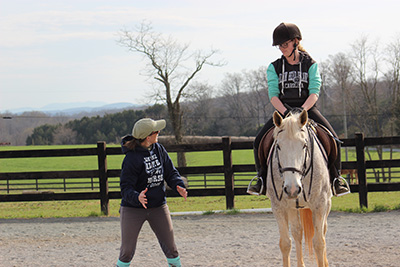
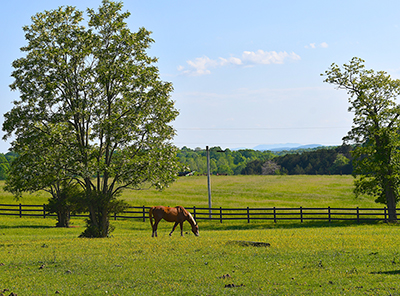
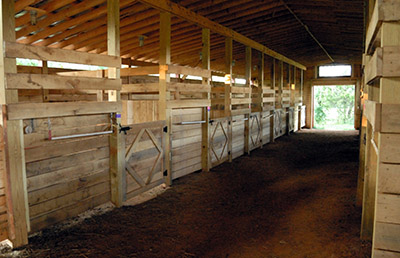
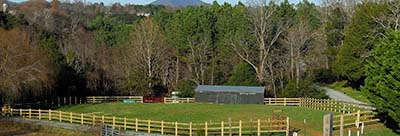
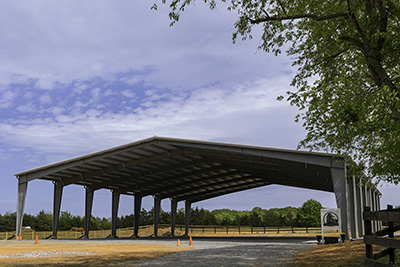
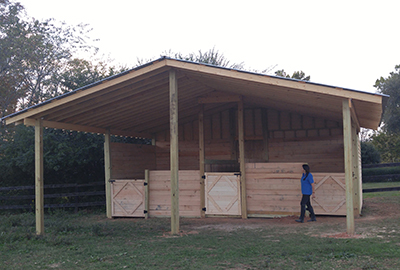
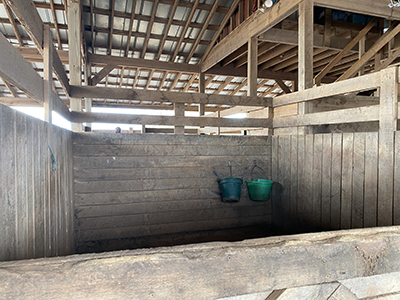
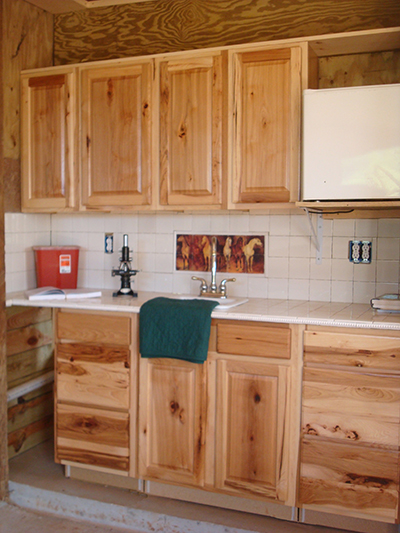
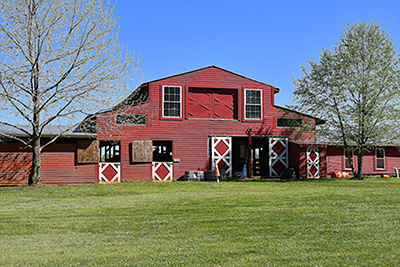
Are the organization's rules, restrictions and warnings (signage) conspicuously posted in easily accessible locations? Yes
Are the organization's emergency contacts, including veterinarian contact information, conspicuously posted in easily accessible locations? Yes
Are human and equine first aid kits easily accessible? Yes
Regarding all shelters where horses are housed including run-in sheds:
Do horses have assigned stalls in the barn/structure(s) or exclusively assigned shelter locations where they are separated from other horses with a barrier? Yes
How many hours per day, on average, are horses stalled or restricted to these sheltered exclusive shelter locations? 0-3;
How often are the stalls/shelters cleaned, i.e., kept in good repair and free of standing water, accumulated waste, sharp objects and debris? 6-7 Days a Week
Do all stalls/shelters allow horses to lie down, stand up and turn around and provide protection from inclement weather (wind, sleet, rain, snow and extreme temperatures)? Yes
Are stalls/shelters kept in good repair, with adequate ceiling height, and free of standing water, accumulated waste, sharp objects and debris? Yes
Are floors constructed and maintained for both good drainage and traction? Yes
Is there a ventilation and circulation system in place to allow free flow of air to control temperature, and humidity, and to prevent air stagnation? Yes
Is wiring inaccessible to horses and maintained for safety in all areas of facility? Yes
Are fire prevention/protection measures (fire alarms, extinguishers and sprinkler systems) maintained and in good working order? Yes
Is there adequate lighting to ensure safety in all areas of facility? Yes
How many hours per day, on average, are horses turned out:
Equines are out 24/7
Equines are out 24/7 except they are brought in to feed
Equines are out 24/7 except they are brought in if there is inclement weather
Equines are out 24/7 except when they are being trained
Equines are out 24/7 except when they are used for the conduct of the organization's programs
The following describes the pastures at this facility:
This facility has a written plan in place for pasture management, which includes guidelines for seeding, fertilizing, irrigation, mowing, dragging, harrowing, manure removal, removal of debris, the control of poisonous plants, and a schedule for cleaning
A dedicated staff person(s) is responsible for pasture management
All pastures are fenced to prevent escape or injury
Fencing checks, such as broken or missing planks, loose fence posts, exposed or loose nails, detached wires, etc., are done regularly
Pastures are rotated
Pastures have natural protection for equines (i.e., trees)
Pastures have man-made protection for equines (i.e., shelters)
This facility does not have pastures where equines can graze on pasture grass
Barbed wire is used for fencing
Electric fencing is used; electric wires or tape fence are visibly marked
The following describes the turnout areas other than pastures at this facility:
This facility has a written plan in place for the maintenance of turnout areas, which includes a schedule for cleaning, manure removal, and dragging
A dedicated staff person(s) is responsible for the maintenance of turnout areas
All turnout areas are fenced to prevent escape or injury
Turnout areas have man-made protection for equines (i.e., shelters)
Fencing checks, such as broken or missing planks, loose fence posts, exposed or loose nails, detached wires, etc., are done regularly
This facility does not have turnout areas
Barbed wire is used for fencing
Electric fencing is used; electric wires or tape fence are visibly marked
The following policies and procedures are in place at the facility to restrict public access and to keep horses safe:
The property owner, staff member or caretaker lives on the premises and ensures that public access is restricted and is responsible for the security of the facility and equines
There is a mechanism in place to monitor equines overnight
By Appointment Only signs are posted.
No Trespassing signs are posted
Hold Harmless signs are posted
Authorized Personnel Only signs are posted
Visitors are only permitted at specific times
Visitors are only permitted in specific areas
The property is fitted with motion lights
A security guard is present at night
Entrance gates are locked at night
The property is fitted with a security system monitored by police or a professional service
The property is fitted with a security system that is monitored internally by staff (or the property owner)
The perimeter of the property is fully fenced
Equine Care/Emergency Preparedness: Brook Hill Retirement Center for Horses, Inc. (*Main) 2026 and 2025 This section is required.
Horse Health Care/Barn Management Records: What system is used to collect and store health/horse care records?
Notebook or equivalent (technology not utilized)
Onsite computer with onsite backup storage system
Onsite computer with cloud-based backup storage system
Our organization utilizes a software application to maintain records
The organization utilizes its own system to maintain records
Our organization would use free cloud-based barn management software if available
The following items are consistent with our feed management plan and practices:
Equines are provided with individualized feeding plans, including supplements, according to the equine's age, breed/type, condition, size, work level and any health issues, consisting of nutritious food provided in sufficient quantity and access to adequate natural forage, or be fed daily, or as recommended by the organization's veterinarian
Feed plans are determined in consultation with a veterinarian
Supplement plans are determined in consultation with a veterinarian
Equines are fed grain in individual stalls
Staff and/or volunteers are trained in proper feed measurements and protocols and observed periodically to ensure they are feeding correctly
The feed chart is centrally located and updated as needed
The area(s) where hay, feed, grain, and supplements are stored are kept clean, free of debris and chemicals, and protected from weather and other animals in rodent-proof and mold-proof containers and grain bins
Feed, supplements and hay types are clearly labeled
Water sources, i.e., buckets, troughs, automatic waterers, etc. are kept clean, free of contaminants, debris and chemicals, protected from weather and other animals, and be positioned or affixed to minimize spillage.
Medications are kept in a secure area
Equines are fed grain in groups
Is clean, potable water available at all times for all equines? Yes
Hoof Care: How often is hoof care provided for each equine? Every 4-8 weeks and when an issue arises
Dental Care: How often is dental care provided for each equine? Annually and when an issue arises
Horse checks: How often are equines visually and physically checked by personnel at the facility? Every day or 6 days a week
Our organization has the following parasite and fly/insect control protocols in place, including remedies used to control flies and insects:
Our organization follows the parasite control guidelines of our veterinarian, including fecal testing and de-worming
Fly/Insect Control Remedies:
Fly Spray Repellent
Fly Masks
Fans
The following represent the biosecurity practices in place at facility:
Our organization follows the biosecurity guidelines of our veterinarian
Sick, affected and/or quarantined equines do not have contact with other equines or other animals
The organization has a written biosecurity plan
Staff are trained in best practices related to biosecurity
Volunteers are trained in best practices related to biosecurity
A specific individual is trained and assigned to care for sick, affected and/or quarantined equines
Sick, affected and/or quarantined equines are cared for last if the caretaker must also care for healthy equines
Restricted access signs are posted at primary points of access to sick, affected and/or quarantined equines
Hand sanitizers are available at all primary points of access to sick, affected and/or quarantined equines
Footbaths are available at all primary points of access to sick, affected and/or quarantined equines
Manure and bedding from sick, affected and/or quarantined equines is removed from the facility - not put in open air piles, and not spread on pastures
Quarantine areas, such as stalls, aisle ways, paddocks, and common areas, are cleaned (and needed, disinfected) after conclusion of the quarantine.
Trailers/vans used by sick, affected and/or quarantined equines are cleaned and disinfected after each use and cleaning takes place away from where equines are sheltered
Equipment used by sick, affected and/or quarantined equines is not shared
Equipment used by sick, affected and/or quarantined equines is cleaned of organic debris and disinfected after each use
Latex gloves, or equivalent gloves, are worn when working with sick, affected and/or quarantined equines
Equines are not quarantined on arrival.
The following represent the manure removal practices in place at facility:
Manure piles are composted or spread on pastures
Our organization adheres to the manure management guidelines set by the state, local authorities, and/or our organization's veterinarian
Manure is stored in dumpster(s)
Manure is piled in an area where equines are not located
Manure piles are covered
Manure is hauled, sold or given away
The following steps are taken to help staff and volunteers readily identify each horse on the property:
Equines are assigned the same exclusive stall/shelter location each day
Name plates are located on the stall/shelter location
A notebook or binder with photos and information on each equine is easily accessible
A map/diagram is posted showing the location of each equine with equine names and photos
Staff and volunteers are provided with an information packet with equine profiles, including photos and detailed descriptions
Staff/volunteers are provided training on conformation, markings, colors, and breeds
Team leaders work with new staff/volunteers until they are able to identify the equines
Photos are located on the stall/shelter location
Equines wear halters with nametags
Equine photos and profiles are available on the website
Our organization has the following policies and procedures in place pertaining to tack, apparel and equipment:
All equines have specifically assigned apparel, equipment and tack (saddles/bridles if ridden) that is not shared
Saddle pads are shared
Blankets, sheets and turn out apparel are fitted and utilized for each equine appropriate to the equine's needs and the weather conditions
Blankets, sheets and turn out apparel are cleaned regularly as needed
Riding Tack is always cleaned after each use
Riding Tack is inspected for overall working condition before each use by trained personnel
Riding Tack is assessed for fit before each use by trained personnel
Riding Tack is assessed for fit by trained personnel when an equine's body condition changes
Riding Tack is assessed for fit by trained personnel when an equine's disposition changes
Assigned riding tack is clearly labeled
Riding Tack is stored in a climate-controlled location
Helmets are cleaned/disinfected after each use
Helmets are replaced after a fall
Saddles are shared
Bridles are shared
Bits are shared
Blankets are shared
Sheets are shared
Turnout apparel is shared
Halters are shared
Riding Tack is always cleaned at least weekly
Riding Tack is cleaned only when needed
This facility enlists the services of a professional saddle fitter at least once a year
Helmets are shared
Helmets are replaced at least every five years.
No equines are ridden; saddles, bridles, etc. not applicable.
Emergency Preparedness: Brook Hill Retirement Center for Horses, Inc.: *Main This section is required.
The following plans, policies, and procedures are in place at the facility to handle emergencies and address weather related issues, fire safety procedures, and/or any additional hazardous scenarios the facility could potentially experience:
Emergency procedures are posted prominently
The facility owns or has access to a generator
The facility maintains at least two weeks of hay, feed, shavings and medications
The facility collects and maintains medical information from staff, volunteers, and clients
The facility maintains appropriate liability and/or workers' compensation insurance
The organization has a written emergency preparedness/safety plan (EPP)
Local fire department and/or the state's emergency planning department procedures
Medical emergencies for clients, staff, and volunteers
Medical emergencies for equines
Evacuation plans
Power outages
Fire
Natural Disasters - thunderstorm, hurricanes, earthquakes, tornados, etc
Terrorist attacks
Protocols to notify emergency personnel
Building/facility exit plans
The facility follows the specific procedures to help PREVENT emergency situations:
Smoking is strictly prohibited
NO SMOKING signs are posted prominently
Hay is stored away from permanent or temporary structures where equines are stalled
Permanent or temporary structures where equines are stalled are kept free of dust, cobwebs, trash, cleaning rags, and other flammable items
Aisles and doorways are kept clear
Heaters with automatic shutoff settings are used
How often are the following checked or performed?
Fire Extinguishers are checked: Monthly
Smoke detectors are checked: Monthly
Fence lines are checked: Weekly
Turnout Areas are checked: Daily
Sprinkler systems are checked: Not at all/NA
Fire drills are conducted: Monthly
Review of safety protocols with staff are conducted: Monthly
Review of safety protocols with volunteers are conducted: Monthly
The Emergency Preparedness Plan is reviewed and updated: Annually
Equine Transportation: 2= Onsite: 1 (1 + 0) + Offsite: 1
2-horse van/trailer with truck:
1 Access offsite;
4-horse van/trailer with truck:
1 Owned onsite
© Copyright 2018 EQUUS Foundation 487 5.00